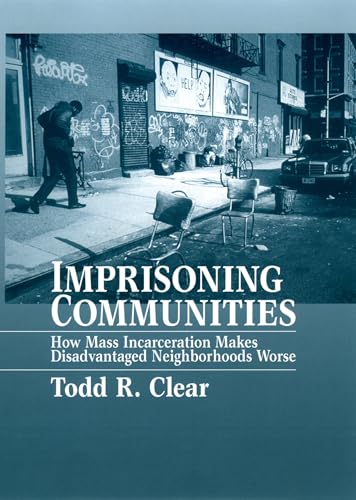Imprisoning Communities
How Mass Incarceration Makes Disadvantaged Neighborhoods Worse (Studies in Crime and Public Policy)
Todd R Clear
BOOK REVIEW

In the haunting tapestry of urban America, where shadows of the past loom large over the future, Imprisoning Communities: How Mass Incarceration Makes Disadvantaged Neighborhoods Worse woven by the astute Todd R. Clear, emerges as a piercing exploration of an insidious cycle. This is no mere academic text; it is a clarion call, begging for your attention, as it delves into the social fabric frayed by the relentless grip of mass incarceration.
Picture this: neighborhoods, once vibrant with dreams, now stifled under the heavy weight of crime and punishment. Clear doesn't just paint a picture; he forces you to confront a monstrous reality. The horrifying statistics are only the beginning; they serve as a foundation for a deeper examination of how the criminal justice system disproportionately impacts impoverished neighborhoods, exacerbating existing issues of poverty, disenfranchisement, and systemic inequality. The emotional landscape of this book is dense, filled with the echoes of families torn apart and communities shattered.
At its core, Clear's work is not only about numbers and policies; it's about human lives. He intimately portrays the stark contrast between those who pass through the prison gates and those left behind, struggling to cope with the aftermath of incarceration. There lies a certain tragedy in understanding that the very act meant to uphold public safety plunges neighborhoods deeper into despair. The spiraling effects of instability reverberate through families and social networks, rippling across generations. Here, every page turned reveals the shouting silence of lost potential and dreams deferred.
Readers have expressed mixed reactions to Clear's stark revelations. Some laud his unflinching examination, appreciating how he challenges the status quo and ignites a discussion that is both necessary and uncomfortable. Others, however, have critiqued it for the lack of tangible solutions presented amid the well-articulated problems. It's this tug-of-war of opinions that encapsulates the essence of a work that bravely ventures into contentious territory - a territory that many would prefer to ignore.
But let's not lose sight of the broader context. This book, published in 2009, came at a time when America was grappling with the fallout of decades of punitive policies and the War on Drugs. Understanding this background enhances the terror of Clear's message. It's a message that reverberates in today's climate, where the conversation around criminal justice continues to evolve yet often stagnates in old paradigms. Clear's insights not only question the efficacy of our current path but also demand a critical reconsideration of what justice truly means in a society riddled with racial and economic disparities.
By amplifying the voices of those living in the shadows of disenfranchisement, Clear beckons you, the reader, to wrestle with discomfort, to acknowledge the inconvenient truths lurking beneath our societal structures. He emboldens you to witness the ways in which incarceration is not merely a consequence of crime but a catalyst for repeating and deepening the cycle of despair.
As you uncover the layers of Imprisoning Communities, you might find yourself ignited with a sense of urgency - an awareness that perhaps the prison-industrial complex is not an isolated issue but rather a symptom of a much deeper sickness within our society. It's a sickness that demands both acknowledgment and action, as the stakes couldn't be higher: entire communities are at play, poised between despair and hope.
The narrative doesn't simply end with the closing paragraph. Rather, it lingers, prompting reflection. What role will you play in addressing these injustices? Will you let the wake of Clear's poignant prose stir your conscience? The choice lies in your hands, and trust me, once you embark on this journey through Clear's gripping analysis, ignoring its imploring call becomes an impossibility. Your worldview may just shift, and the way you perceive justice could forever alter. Buckle up; it's going to be a wild ride through the truth.
📖 Imprisoning Communities: How Mass Incarceration Makes Disadvantaged Neighborhoods Worse (Studies in Crime and Public Policy)
✍ by Todd R Clear
🧾 255 pages
2009
#imprisoning #communities #mass #incarceration #makes #disadvantaged #neighborhoods #worse #studies #crime #public #policy #todd #clear #ToddRClear